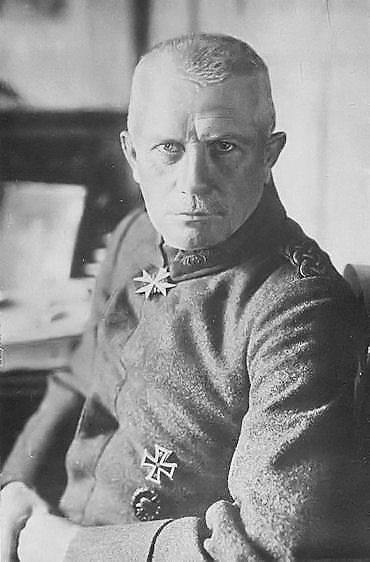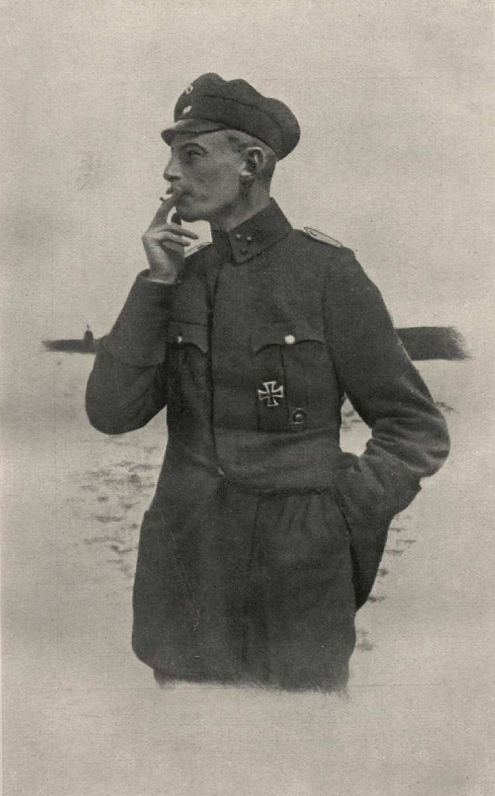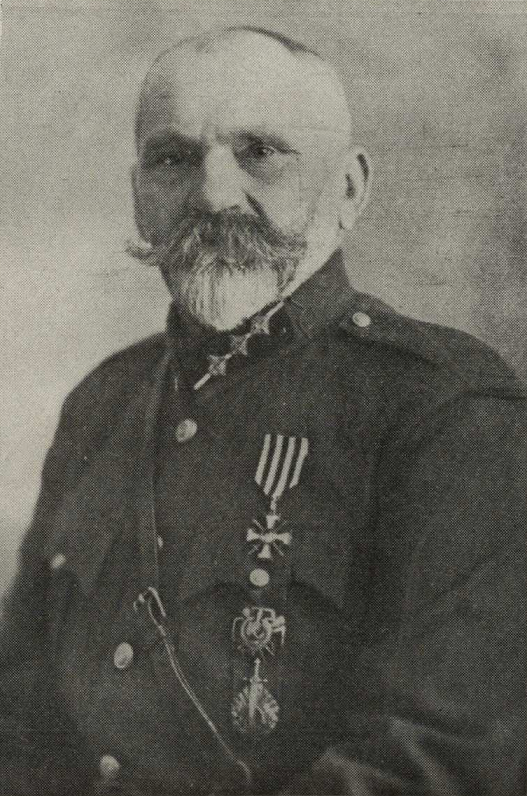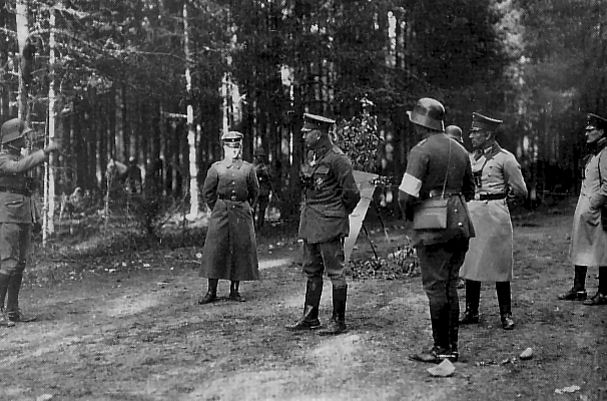Smoke and mirrors
After the putsch, an organization with no political power whatsoever claimed power in Kurzeme and Zemgale. It had a strange name: the Security Committee of the Homeland Front Army. But a few people had any illusions about that there's someone else except German general Rüdiger von der Goltz behind it. He organized the coup and is thought to have later pulled the strings behind the puppet governments of Liepāja prosecutor Oskars Borkovskis and pastor Andrievs Niedra.
Goltz did everything he could to distance himself from the coup. Just like Niedra, he later blamed hot-blooded youths from the Landeswehr for organizing and carrying out the putsch. They had supposedly been dissatisfied with the government's work and its plans to divide the land owned by the local Baltic German aristocracy.
In his memoirs, Goltz wrote:
"I sympathized with their mood completely and could only congratulate it in the name of the Reich's Germans. Germany had to see to it that their neighboring country doesn't fall to the Bolsheviks or Germanophobes. It should also be taken into account that the local German elite takes a position that reflects its history, as well as its economic and spiritual meaning, without which nothing of use would have come from his wild country. [..] A Rīga and Jelgava ruled by Latvians was something unthinkable, reactionary."
Goltz, like Borkovskis and the entire Baltic German political elite, issued formal condemnations of the April 16 putsch, trying to portray it abroad as a domestic political crisis that had nothing to do with Germany and its strategic goals in the region.

Provisional Government ignores danger
But later on in his memoirs Goltz would write that there was talk of an impending coup starting from early March. He had named Ulmanis' government among his major enemies right after the Bolsheviks and the German Soldiers' Council, which he had disbanded under threat of force two weeks before the April 16 coup.
The impending coup was no secret to the Provisional Government, which, however, underestimated the threat; this may have stalled the putsch for a couple of days. Lieutenant Sergejs Staprāns, Latvia's first chief of intelligence, had obtained information over the planned coup in March.
Staprāns wrote:
"In late March and particularly in early April my agency at Goltz's headquarters reported that a coup is being prepared in earnest, with the goal of toppling Ulmanis' government and creating a puppet government obedient to Goltz. He would use it to signal the "will" of the Latvian people to outside parties, namely the will to join Germany.
"When I had summed everything up and added new information, by April 10 I was able to report to the Minister of War that a putsch by the German barons and Goltz is to follow within the next few days. I had information that Baron Manteuffel's unit, about 500 to 600 men, would be recalled from the front to start and carry out the coup. As it arrives in Liepāja, the putsch will have started. Defense Minister Jānis Zālītis did not believe there could be a putsch, saying that "the Germans would be crazy if, at a time of general ceasefire with peace talks taking place in Paris, they caused an uproar thus willingly harming their position at the peace conference. You can't carry out a silent coup; they should know that."
Defense Minister Zālītis, just like PM Ulmanis, thought that it's impossible to organize a coup before the very eyes of the UK and US missions active in Liepāja. This would turn out to be misguided. Just like the assumption that Germany wouldn't want to risk wrecking their chances at getting a good treaty at Versailles. General Goltz and his associates actually wanted to escape accepting the humiliating treaty and were ready to wage war against the Entente.
A meticulously prepared coup
General Goltz had planned the putsch rather carefully. At first he spread rumors of a supposed Bolshevik uprising that would soon take place in Liepāja. To prevent this, volunteer units of German soldiers were brought into Liepāja along with the strong, experienced and radically minded Baltic German unit commanded by the 25-year-old lieutenant Baron Hans von Manteuffel.

On April 13 in Liepāja, German soldiers started provoking the Latvians with the goal of causing armed fighting. Goltz had a single plan – with gunfights starting in the city, as the governor of Liepāja he would have the right to use his forces to "ensure public order", which would mean disarming Latvian units and arresting the government after deeming it "Bolshevik". But Latvian soldiers did not answer the Germans' provocation and April 16 arrived in a very tense atmosphere indeed.
Goltz knew that possible Latvian resistance would ensue across Kurzeme and Zemgale, where about 3,600 Latvian soldiers were stationed at the time. The brigade under Colonel Jānis Balodis was the strongest unit. Back then it was at the Kalnciems front. Early on April 16, Major Alfred Fletcher arrived at Kalnciems and spent the day inspecting Latvian positions. The Landeswehr's political chief likewise arrived unexpectedly that same day while a German pastor took it upon to himself to lead a service. Colonel Balodis and his soldiers were to be monitored during the coup.
Provisional government makes its escape
Aleksandrs Plensners, a high-ranking official at the Latvian Army, recalls the day:
"When we rushed to work early on April 16, the city seemed strange. Heavy armored transports, ready to shoot at any minute, were rolling across the streets. It was the same scene we saw in Liepāja when Goltz disbanded the soldiers' council. An armored train was stationed by the bridge. It was near the government seat with weapons turned against it. I tried calling Durbe, Aizpute, Jegava. Nothing. Communications had been cut off.
I went to the PM to report this. Ādolfs Bļodnieks, an aide-de-camp of the chief of the fledgling armed forces rushed inside telling that the Foefer battalion had attacked their headquarters, killing a soldier, with disarming and arrests being carried out. He had made it outside and rushed to report this. We enter the PM's office. He says immediately: "Let's go to the count." He asked me to take other officers with me and to see that they are well armed.
So we went, PM Ulmanis, doctor [Miķelis] Valters, colonel [Zāmuels] Adienis, me, the ministry commandant Bulle, as well as Lūkins and Bļodnieks. As we went outside, the PM asked us whether we had any guns. Yes, our pistols were visible."
At about 1 p.m. Ulmanis and his entourage visited general Goltz and spent 90 minutes in heated but fruitless discussion. During this time, the German units carried out a coup by attacking Latvian army units and state institutions. The perpetrators killed three Latvian soldiers and disarmed a couple hundred of soldiers. After meeting Goltz, Ulmanis rushed to the premises of the UK mission. Ulmanis was able to escape, but the Germans arrested Interior Minister Miķelis Valters and Food Minister Jānis Blumbergs. Several members of the People's Council of Latvia were arrested, along with Liepāja mayor Ansis Buševics. Paradoxically, the Germans managed to detain the ministers who Goltz sympathized with, but those he thought were Germanophobes – Jānis Zālītis and Jānis Goldmanis – were able to escape.
Defense Minister Jānis Zālītis – who was returning from the front at that time – was warned about the coup at a railway station. Latvian military units under Colonel Jānis Apinis were preparing for battle. Latvians managed to fend off the German attack on Durbe on April 17, killing four and wounding thirteen men. On the heels of this success, Apinis offered Zālītis to pull the forces to Liepāja where they would unite with the units of the Liepāja garrison and either move to Estonia or, should the English fleet offer help, invade the city and restore the Ulmanis government. Zālītis did okay the plan but the attack on Liepāja never took place.
A turning point
On April 21 Colonel Apinis was instructed not to fight the Germans. The British mission had convinced Ulmanis that his government would be reinstated via diplomatic and political means. Indeed, things weren't going well for Goltz, who had failed for a week and a half to set up a new government. Meanwhile Colonel Balodis refused to become involved in the military cabinet, and prince Anatol von Lieven followed suit. The Germans had extended an offer to fly Balodis to Liepāja, but he said he won't become involved in politics and remained loyal to the Ulmanis government. After the Brits issued an ultimatum, Goltz had no choice but to set up a government with little-known Oskars Borkovskis at the helm. At the same time, he sought someone with more clout for the post and finally decided on the adventurous Lutheran pastor Andrievs Niedra.

After setting up the new government, Goltz was finally in a position to carry out a reckoning against Jānis Apinis' units near Liepāja. He sent expeditions to Priekule, Skrunda, Rudbārži and Durbe to supposedly quell an uprising. On April 28 the Germans invaded Rudbārži and Skrunda, while the Krote Manor fell on April 29, with Colonel Apinis arrested. On April 30 the last remaining bastion, Durbe, was occupied, meaning the putsch was complete, paving way for Goltz's unscrupulous future ventures in Latvia. These cost thousands of Latvian, German and Estonian lives through summer 1919 near Cēsis and in the fall in Rīga.
Meanwhile the April 16 coup greatly increased the popularity of the Ulmanis government among Latvians. Now it was clear to everyone, including Ulmanis' staunchest opponents, that the Provisional Government weren't German puppets. Even the Social Democrats, long staying in the opposition, expressed their unwavering support for the PM. Thus April 16 became a turning point in the Latvian Independence War.


























